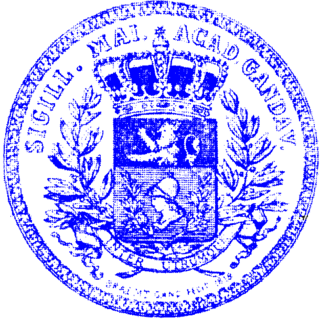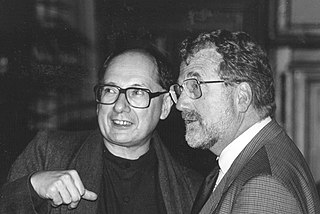
Ghent University is a public research university located in Ghent, Belgium.

Agrobacterium is a genus of Gram-negative bacteria established by H. J. Conn that uses horizontal gene transfer to cause tumors in plants. Agrobacterium tumefaciens is the most commonly studied species in this genus. Agrobacterium is well known for its ability to transfer DNA between itself and plants, and for this reason it has become an important tool for genetic engineering.

The transfer DNA is the transferred DNA of the tumor-inducing (Ti) plasmid of some species of bacteria such as Agrobacterium tumefaciens and Agrobacterium rhizogenes . The T-DNA is transferred from bacterium into the host plant's nuclear DNA genome. The capability of this specialized tumor-inducing (Ti) plasmid is attributed to two essential regions required for DNA transfer to the host cell. The T-DNA is bordered by 25-base-pair repeats on each end. Transfer is initiated at the right border and terminated at the left border and requires the vir genes of the Ti plasmid.

Agoria, previously known as Fabrimetal, is a Belgian employers' organization and member of the Federation of Belgian Enterprises.

VIB is a research institute located in Flanders, Belgium. It was founded by the Flemish government in 1995, and became a full-fledged institute on 1 January 1996. The main objective of VIB is to strengthen the excellence of Flemish life sciences research and to turn the results into new economic growth. VIB spends almost 80% of its budget on research activities, while almost 12% is spent on technology transfer activities and stimulating the creation of new businesses, in addition VIB spends approximately 2% on socio-economic activities. VIB is member of EU-LIFE, an alliance of leading life sciences research centres in Europe.
The Flemish Institute for Technological Research, is an independent Flemish research organisation that provides scientific advice and technological innovations that facilitate the transition to a sustainable society, and this in the areas of energy, chemistry, materials, health and land use.
Walter Fiers was a Belgian molecular biologist.

Jozef Stefaan "Jeff", Baron Schell was a Belgian molecular biologist.

Marc, Baron Van Montagu is a Belgian molecular biologist. He was full professor and director of the Laboratory of Genetics at the faculty of Sciences at Ghent University (Belgium) and scientific director of the genetics department of the Flanders Interuniversity Institute for Biotechnology (VIB). Together with Jozef Schell he founded the biotech company Plant Genetic Systems Inc. (Belgium) in 1982, of which he was scientific director and member of the board of directors. Van Montagu was also involved in founding the biotech company CropDesign, of which he was a board member from 1998 to 2004. He is president of the Public Research and Regulation Initiative (PRRI).
CropDesign is a biotech company located in Ghent, Belgium. The company develops a portfolio of agronomic traits for the global commercial seed markets. It has developed a technology platform to discover genetic traits for the improvement of corn, rice and other plants. Current managing director is Juergen Logemann.

Plant Genetic Systems (PGS), since 2002 part of Bayer CropScience, is a biotech company located in Ghent, Belgium. The focus of its activities is the genetic engineering of plants. The company is best known for its work in the development of insect-resistant transgenic plants.
The Artois-Baillet Latour Foundation is a Belgian non-profit organization which was founded on 1 March 1974.
Frans Van Roy is a Belgian molecular biologist and professor at the University of Ghent. He is head of the VIB Department for Molecular Biomedical Research, UGent. His research interest is on the molecular mechanisms underlying the pathology and the cure of cancer and inflammation-related disorders.
Hugo Van Heuverswyn is a Belgian molecular biologist, biotech pioneer, entrepreneur and businessman. He has been the chairman of the VIB, Flanders Institute for Biotechnology, since its inception in 1995.
Marc Zabeau is a Belgian scientist and businessman.

The Zwijnaarde science park is a science park of Ghent University, located in Zwijnaarde near Ghent (Belgium). The science park has an area of 52 hectare (ha) and comprises the Ardoyen campus of the University of Ghent and the Ardoyen science park. The Ardoyen campus comprises several institutes of the engineering and science faculty of the university. The science park comprises a business incubator and about 40 companies employing about 1500 scientists. Most of the companies are biotech and ICT companies, which are spin-offs of the university or the Flanders Institute for Biotechnology (VIB).
Ann Van Gysel is a Belgian scientist and CEO of MEDVIA, a healthcare cluster that supports innovation in Flanders, Belgium.

Genetic engineering is the science of manipulating genetic material of an organism. The concept of genetic engineering was first proposed by Nikolay Timofeev-Ressovsky in 1934. The first artificial genetic modification accomplished using biotechnology was transgenesis, the process of transferring genes from one organism to another, first accomplished by Herbert Boyer and Stanley Cohen in 1973. It was the result of a series of advancements in techniques that allowed the direct modification of the genome. Important advances included the discovery of restriction enzymes and DNA ligases, the ability to design plasmids and technologies like polymerase chain reaction and sequencing. Transformation of the DNA into a host organism was accomplished with the invention of biolistics, Agrobacterium-mediated recombination and microinjection. The first genetically modified animal was a mouse created in 1974 by Rudolf Jaenisch. In 1976, the technology was commercialised, with the advent of genetically modified bacteria that produced somatostatin, followed by insulin in 1978. In 1983, an antibiotic resistant gene was inserted into tobacco, leading to the first genetically engineered plant. Advances followed that allowed scientists to manipulate and add genes to a variety of different organisms and induce a range of different effects. Plants were first commercialized with virus resistant tobacco released in China in 1992. The first genetically modified food was the Flavr Savr tomato marketed in 1994. By 2010, 29 countries had planted commercialized biotech crops. In 2000 a paper published in Science introduced golden rice, the first food developed with increased nutrient value.

Genetic engineering techniques allow the modification of animal and plant genomes. Techniques have been devised to insert, delete, and modify DNA at multiple levels, ranging from a specific base pair in a specific gene to entire genes. There are a number of steps that are followed before a genetically modified organism (GMO) is created. Genetic engineers must first choose what gene they wish to insert, modify, or delete. The gene must then be isolated and incorporated, along with other genetic elements, into a suitable vector. This vector is then used to insert the gene into the host genome, creating a transgenic or edited organism.
Tilak Raj Sharma is an Indian plant biologist, the Deputy Director General (CS) of ICAR and former executive director and chief executive officer of the National Agri-Food Biotechnology Institute (NABI), and Center of Innovative and Applied Bioprocessing (CIAB) respectively, both autonomous institutes under the Department of Biotechnology. Known for his studies in the fields of genomics and plant disease resistance, Sharma is an elected fellow of the National Academy of Sciences, India, the National Academy of Agricultural Sciences and the Indian National Science Academy. The Department of Biotechnology of the Government of India awarded him the National Bioscience Award for Career Development, one of the highest Indian science awards, for his contributions to biosciences in 2007.







